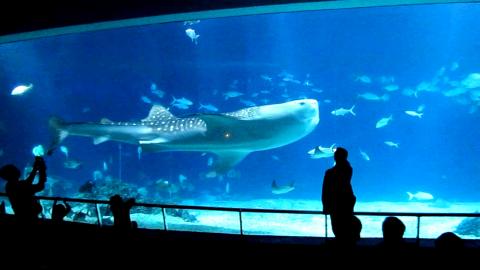The Environment and Animal Society of Taiwan (EAST) and several other environmental groups yesterday said that the National Museum of Marine Biology and Aquarium kept whale sharks in small tanks that caused their health to deteriorate.
The group urged the aquarium to release the last remaining whale shark and not to bring in new ones.
According to EAST director Chen Yu-min (陳玉敏), the aquarium in Pingtung County has held three whale sharks — a species that has been listed on “Appendix II” of the Convention on International Trade in Endangered Species of Wild Fauna and Flora and labeled “vulnerable” by the International Union for Conservation of Nature — in captivity since April 2004, in the name of education and marine research.

Photo courtesy of the Environment and Animal Society of Taiwan
The groups’ investigation suggested that one whale shark died of poor health in 2007, another was secretly released into the ocean without undergoing rehabilitation or tagging for follow-up research the same year and the remaining 6m-long whale shark was being kept in a small tank, Chen said.
Showing a video clip and photographs of the remaining whale shark at a press conference in Taipei yesterday, Chen said that it had scars on its tail from hitting the tank’s walls and reefs in the tank because the tank was too small.
Citing data from whale shark tag release research conducted by Chuang Shou-cheng (莊守正), an associate professor at the National Taiwan Ocean University’s Department of Environmental Biology and Fisheries Science, the groups said that whale sharks often stay in deep waters — about 5m to 10m below the sea surface, but sometimes submerge to 80m below sea level, and that they can migrate up to 34km a day.
Keeping the whale shark in its current tank, which is 33m long, 22m wide and about 8m to 12m in depth, is like keeping it in a jail cell, the groups said, adding that the video showed the whale shark swimming in the tank in the same circling direction.
It took the whale shark about 50 to 80 seconds to swim a circle in the tank, which meant that it would swim about 360 to 576 circles just in the eight hours that the aquarium was open daily, the groups said.
Lai Wei-jen (賴威任), office director of the Kuroshio Ocean Education Foundation, said whale sharks have a life span of about 70 to 100 years in the ocean, but data from an aquarium in Okinawa, Japan, showed that 16 whale sharks kept in captivity during the period from 1980 to 1998 lived for an average of only 16 months.
Lee Chan-rong (李展榮), an official at the aquarium, said the aquarium has proposed to tag release the remaining whale shark after it introduces a new small whale shark into the tank, allowing the bigger whale shark to teach the new whale shark for a while.
The groups urged the government not to approve the proposal to introduce any whale sharks, and to ask the aquarium to tag release the remaining whale shark as soon as possible.

Alain Robert, known as the "French Spider-Man," praised Alex Honnold as exceptionally well-prepared after the US climber completed a free solo ascent of Taipei 101 yesterday. Robert said Honnold's ascent of the 508m-tall skyscraper in just more than one-and-a-half hours without using safety ropes or equipment was a remarkable achievement. "This is my life," he said in an interview conducted in French, adding that he liked the feeling of being "on the edge of danger." The 63-year-old Frenchman climbed Taipei 101 using ropes in December 2004, taking about four hours to reach the top. On a one-to-10 scale of difficulty, Robert said Taipei 101

Nipah virus infection is to be officially listed as a category 5 notifiable infectious disease in Taiwan in March, while clinical treatment guidelines are being formulated, the Centers for Disease Control (CDC) said yesterday. With Nipah infections being reported in other countries and considering its relatively high fatality rate, the centers on Jan. 16 announced that it would be listed as a notifiable infectious disease to bolster the nation’s systematic early warning system and increase public awareness, the CDC said. Bangladesh reported four fatal cases last year in separate districts, with three linked to raw date palm sap consumption, CDC Epidemic Intelligence

US climber Alex Honnold left Taiwan this morning a day after completing a free-solo ascent of Taipei 101, a feat that drew cheers from onlookers and gained widespread international attention. Honnold yesterday scaled the 101-story skyscraper without a rope or safety harness. The climb — the highest urban free-solo ascent ever attempted — took just more than 90 minutes and was streamed live on Netflix. It was covered by major international news outlets including CNN, the New York Times, the Guardian and the Wall Street Journal. As Honnold prepared to leave Taiwan today, he attracted a crowd when he and his wife, Sanni,

Taiwanese and US defense groups are collaborating to introduce deployable, semi-autonomous manufacturing systems for drones and components in a boost to the nation’s supply chain resilience. Taiwan’s G-Tech Optroelectronics Corp subsidiary GTOC and the US’ Aerkomm Inc on Friday announced an agreement with fellow US-based Firestorm Lab to adopt the latter’s xCell, a technology featuring 3D printers fitted in 6.1m container units. The systems enable aerial platforms and parts to be produced in high volumes from dispersed nodes capable of rapid redeployment, to minimize the risk of enemy strikes and to meet field requirements, they said. Firestorm chief technology officer Ian Muceus said